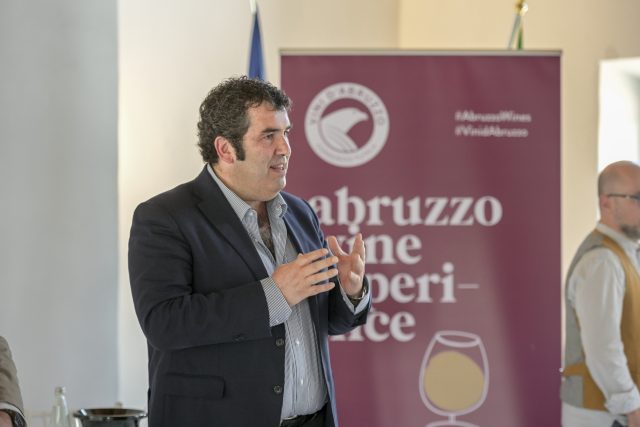This website uses cookies so that we can provide you with the best user experience possible. Cookie information is stored in your browser and performs functions such as recognising you when you return to our website and helping our team to understand which sections of the website you find most interesting and useful.
‘We want to share our products, our traditions, our territory’
Consorzio Tutela Vini d’Abruzzo president Alessandro Nicodemi tells db about the Italian region’s international ambitions, and what the introduction of Superiore status this year means for its wine industry.

Speaking with the drinks business at this year’s Abruzzo Wine Experience tasting held near Città Sant’Angelo, in the province of Pescata, Nicodemi, who was elected to the role of president last autumn, outlined some of the key developments in Abruzzese wine.
The big news for producers in Abruzzo this year is that the 2023 harvest will see the introduction of new labelling legislation that could signify a premiumisation of the region’s wines.
“Montepulciano d’Abruzzo is an open denomination, because though we are the only producers, everyone in other regions can bottle it. 50% of Montepulciano d’Abruzzo is bottled in other regions,” Nicodemi explained.
For wines to be given Superiore and Riserva status, production must occur entirely within Abruzzo.
“The aim is to create Superiore wines that only Abruzzo can produce, where the whole process, from the harvest to the bottling, is done within Abruzzo. Superiore and Riserva can only be produced in the four sub-zones [Colline Teramane, Colline Pescaresi, Terre de L’Aquila, and Terre di Chieti].”
Speaking about other key trends from the region, Nicodemi cited stylistic shifts: “Of course, Cerasuolo is growing a lot on the market. We also hope that sparkling wine will grow. The most important wine is still Montepulciano d’Abruzzo, but we’re trying to promote a new, lighter aspect to it.”
Cerasuolo d’Abruzzo, the dark-hued rosato made from Montepulciano, and lighter Montepulciano d’Abruzzo were the subject of two separate masterclasses at the event from db contributor Filippo Bartolotta.
Last year, DOC production, including Montepulciano d’Abruzzo DOC, Cerasuolo d’Abruzzo DOC and Trebbiano d’Abruzzo DOC, equated to approximately 140 million bottles.
Given this writer’s nationality, it was not long before the subject of Brexit arose. When asked if the paperwork and delays have caused problems for Abruzzo’s producers, Nicodemi said: “Since then things have changed. Before, everything was alright, it took three or four days to export to London. Now, it takes two or three weeks, because the products are held at Calais, so we lose time. It’s more difficult.”
Nicodemi reassured that, despite the challenges, the UK remains an important market for the region.
In term of international ambitions elsewhere in the world, Nicodemi said: “The most important market is ‘Old Europe’ [western/northern European countries], then the United States, and then Eastern Asia. To appeal to these consumers, we use masterclasses, meeting press, and tastings open to the public. Masterclasses help us to educate and inform customers about our wines.”
According to data provided by the consorzio concerning the period of3 January to September 2022, Germany is the most valuable export market for Abruzzese wines, with a 20.1% share of the total, followed by the US with 14.2%, Canada with 9.1%, Switzerland at 8.5%, and, just behind in fifth place, the UK at 8.4%. Exports to Japan currently only constitute 3.5% of the total international export value.
Overall, the value of exports of Abruzzese wine in 2022 was 10% above the 2021 level, partly due to the recovery of the on-trade sector after the restrictions of the pandemic.
Wine tourism is another area that can introduce overseas visitors to Abruzzese wine. “We as a consorzio are trying to promote wine tourism with Abruzzo Wine Experience – we want to share our products, our traditions, our territory. Tourists go to Abruzzo for the mountains and nature – our landscape is uncontaminated.”
But, producers throughout Italy are concerned by climate change. Recent extreme rainfall in the north, after a period of prolonged drought, has sounded alarm bells. Nicodemi described it as a “big problem”, but shared that the DOC regulations have changed to increase the permitted altitude for growers to cultivate vines of all varieties at from 600 metres above sea level to 800: “Because it’s hotter now, you have to go higher.”
Related reading: ‘Sicily is a wine continent’

